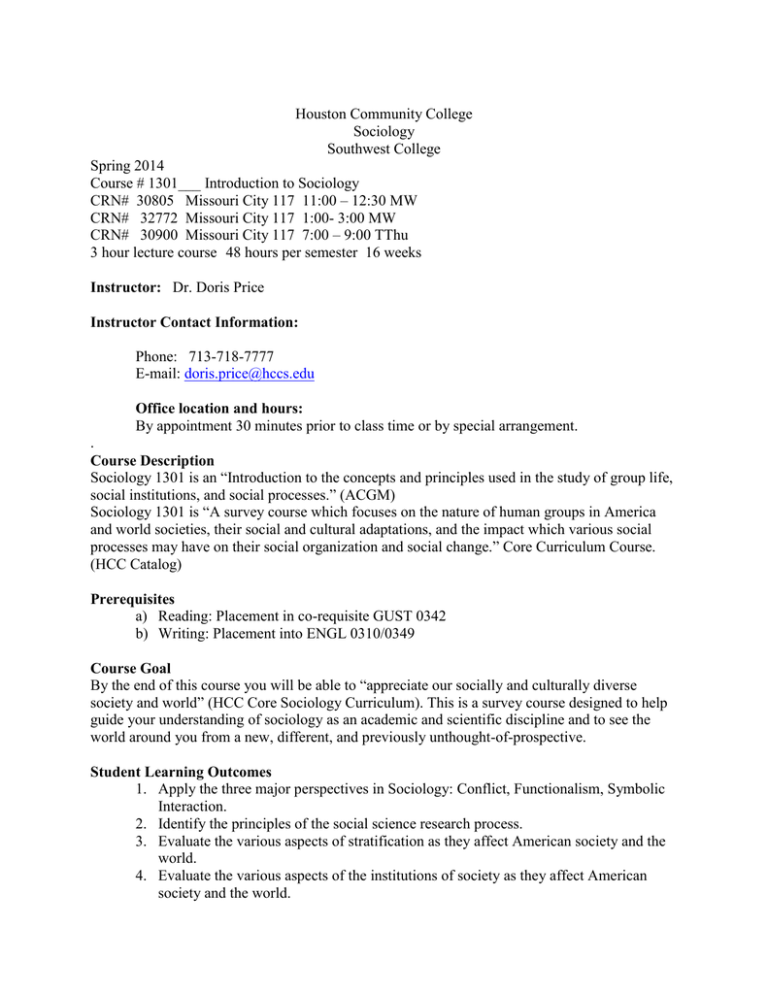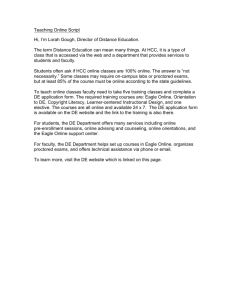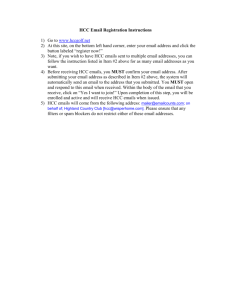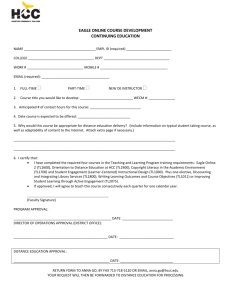
Houston Community College
Sociology
Southwest College
Spring 2014
Course # 1301___ Introduction to Sociology
CRN# 30805 Missouri City 117 11:00 – 12:30 MW
CRN# 32772 Missouri City 117 1:00- 3:00 MW
CRN# 30900 Missouri City 117 7:00 – 9:00 TThu
3 hour lecture course 48 hours per semester 16 weeks
Instructor: Dr. Doris Price
Instructor Contact Information:
Phone: 713-718-7777
E-mail: doris.price@hccs.edu
Office location and hours:
By appointment 30 minutes prior to class time or by special arrangement.
.
Course Description
Sociology 1301 is an “Introduction to the concepts and principles used in the study of group life,
social institutions, and social processes.” (ACGM)
Sociology 1301 is “A survey course which focuses on the nature of human groups in America
and world societies, their social and cultural adaptations, and the impact which various social
processes may have on their social organization and social change.” Core Curriculum Course.
(HCC Catalog)
Prerequisites
a) Reading: Placement in co-requisite GUST 0342
b) Writing: Placement into ENGL 0310/0349
Course Goal
By the end of this course you will be able to “appreciate our socially and culturally diverse
society and world” (HCC Core Sociology Curriculum). This is a survey course designed to help
guide your understanding of sociology as an academic and scientific discipline and to see the
world around you from a new, different, and previously unthought-of-prospective.
Student Learning Outcomes
1. Apply the three major perspectives in Sociology: Conflict, Functionalism, Symbolic
Interaction.
2. Identify the principles of the social science research process.
3. Evaluate the various aspects of stratification as they affect American society and the
world.
4. Evaluate the various aspects of the institutions of society as they affect American
society and the world.
Learning Objectives
1. Appreciate information about the background and history of Sociology.
2. Analyze the seminal theorists in Sociology, their theories, and how those theories
translate to the real world.
3. Discriminate among and between various critical thinking fallacies.
4. Evaluate theories of collective behavior and social movements and the impact on
people’s lives in the real world.
5. Illustrate Sociological experiments as found in a textbook or a peer-reviewed journal
and discuss the study in terms of the scientific method.
6. Delineate scientific research methods.
7. Evaluate theories of stratification and the impact on people’s lives in the
real world.
8. Evaluate theories of globalization and social change and the impact on
people’s lives in the real world.
9. Evaluate theories of population, urbanization, and environment and the impact on
people’s lives in the real world.
10. Evaluate the major theories of each institutions of society.
Core Curriculum Statement
Sociology 1301 is a core curriculum course. It may be used to fulfill the requirements for a core
Social and Behavioral Sciences course or a core Cross/Multi-Cultural Studies Course.
Course Calendar
*Exam dates are subject to possible changes
Week 1
Week 2
Week 3
Week 4
Week 5
Week 6
Week 7
Week 8
Week 9
Week 10
Week 11
Week12
Week 13
Week 14
Week 15
Week 16
August 25 & 27 MW
Classes Begin (Drop/Add/Swap Fee $15.00)
September 1 & 3 MW
Labor Day Holiday & Class
September 8 & 10 MW
Official date of Record on September 8th
September 15 & 17 MW
September 22 & 24 MW & 23rd and 25 TThu
Second Start Classes
September 29 & Oct. 1 MW and 2 TThu
October 6 & 8 MW and 7 & 9 TThu
October 13 & 15 MW and 14 & 16 TThu
October 20 & 22 MW and 21 and 23 TThu
October 27 & 29 MW and 28 & 30 TThu
November 3 & 5 MW and 4 & 6 TThu
November 10 & 12 MW and 11 & 13 TThu
November 17 & 19 MW and 18 & 20 TThu
November 24 & 26 MW and November 25 & 27 Thanksgiving 27th
December 1 & 3 MW and 2 & 4 TThu
December 8 MW Final Exam and December 10 TThu Final Exam
Final Exam
Please see exam schedule at the end of the syllabus
* Sixth and Final Exam (Week) – Adhere to Exam Schedule
*Final Exams are mandatory as per final exam schedule
Instructional Methods
Methods of Instruction may include lecture; various assigned readings from textbooks, peerreviewed articles, books, internet research, original source seminal texts and other original
source material, files, field trips, etc.
Assignments
Assignments/Activities: Various assigned readings from textbooks, peer-reviewed articles,
books, original seminal texts and other original source material; mandatory discussions based on
various topics related to the major areas of study; debates, writing papers including essays,
analyses, reviews, research, comparing and contrasting theories and perspectives; service
learning projects; presentations; group and/or individual projects; portfolios may be used to
emphasize the subject.
Assessments
Methods of Assessment./Evaluation: Essays, internet searches with concomitant essays; in-class
debates; in-class discussions; oral and written peer-reviewed article reviews and discussions; oral
and written book reviews and discussions; reading and writing seminal texts and theories,
research papers; quizzes which may include: definitions, matching, multiple choice, true/false,
short answer, brief essay; lists; service learning projects, presentations; group and /or individual
projects; portfolios; other methods as may be determined by individual instructors.
Instructional Materials
Society: the basics by John J. Macionis, Published by Pearson-Prentice Hall; 13th Edition –
Published 2013; ISBN-13-978-0-13- 98251-6.
HCC Policy Statement: ADA
“Any student with a documented disability (e.g. physical, learning, psychiatric, vision, hearing,
etc) who needs to arrange reasonable accommodations must contact the appropriate HCC
disability Support Service (DSS) Counselor at the beginning of each semester. Faculty is
authorized to provide only the accommodations requested by the Disability Support Services
Office. Students who are requesting special testing accommodations must first contact the
appropriate (most convenient) DSS office for assistance:
Disability Support Services Offices:
System:
713-718-516 5
Central:
713-718-6164 also for deaf and hard of hearing services and students outside of
the HCC District service areas.
Northwest:
713-718-5422
Northeast:
713-718-8420
Southeast:
713-718-7218
Southwest:
713-718-7909
“After student accommodation letters have been approved by the DSS office and submitted to
DE Counseling for processing, student’s will receive an email Confirmation
informing them of the instructional Support Specialist assigned to their professor.
HCC Policy Statement: Academic Integrity
“Scholastic dishonesty includes, but is not limited to, Unethical behavior on a test, plagiarism,
and collusion.” Cheating on a test includes, but is not limited to:
Copying from another student’s test paper.
Using, during an exam, materials not authorized by the person giving the test.
Collaborating with another student during an exam without authorization
Knowingly using, buying, selling, stealing, transporting, or soliciting in whole or
in part, the contents of an un administered exam.
Substituting for another student, or permitting another student to substitute for
one’s self, to take an exam.
Bribing another person to obtain an exam that will be administered.
Any act that the instructor deems inappropriate while taking an exam e
Plagiarism means the use of another person’s work without acknowledging, with specific
reference to name, date, page and other source identification, in written work that you submit for
credit. ‘Collusion’ means the unauthorized collaboration with another person in preparing work
offered for credit.” (HCC Core Sociology Curriculum).
HCC Policy Statement: Class Attendance
The following statements appear in the college catalog regarding class attendance: “Students
are expected to attend classes regularly.” Students are responsible for material covered during
their absences, and it is the student’s responsibility to follow up and obtain information that was
missed during their absence. Class attendance is checked daily by the instructors. Although it is
the responsibility of the student to drop a course for non--attendance, the instructor has the
authority to drop a student for excessive absences. A student may be dropped from a course
for absenteeism after the student has accumulated absences in excess of 12.5 percent of the hours
of instruction (including lecture and laboratory time). For example: For a three credit- hour
lecture class meeting three hours per week (48 hours of instruction), a student may be dropped
after six hours per week (96 hours of instruction), a student may be dropped after 12 hours of
absences. Certain departments or programs may be governed by accrediting or certification
standards that require more stringent attendance policies. NOTE: IT IS THE
RESPONSIBILITY OF THE STUDENT TO WITHDRAW OFFICIALLY FROM A
COURSE. Administrative drops are at the discretion of the instructor. Failure of a student to
withdraw officially could result in the student receiving a grade of “F” in the course. For the
deadline for course withdrawal, check the current course Schedule of Course.”
HCC Policy Statement: Course Withdrawal
To help student avoid having to drop/withdraw from any class. HCC has instituted an Early Alert
process by which your professor may “alert” you and HCCS counselors that you might fail a
class because of excessive absences and/or poor academic performance. Contact your professor
regarding your academic performance or a counselor to learn about what, if any, HCC
intervention might be available to assist you- online tutoring, child care, financial aid, job
placement, etc.- to stay in class and improve your academic performance.
In order to withdraw from a class, you MUST contact your professor and this must be
done prior to the withdrawal deadline to receive a “W” on your transcript. If you do not
withdraw before the deadline, you will receive the grade that you have earned by the end of the
semester. Zeros averaged in for required assignments/tests not submitted will lower your
semester average significantly, most likely resulting in a failing grade (F). If you do not feel
comfortable contacting your professor to withdraw, you may contact a counselor. However,
please do not contact both a counselor and your professor to request withdrawal; either one is
sufficient.
Error Reference source not found. Classes of other duration (mini-term, flex-entry, 8
weeks, etc.) may have different final withdrawal deadlines. Please visit the online registration
calendars or contact the HCC Registrar’s Office to determine class withdrawal deadlines.
Remember to allow a 24 hour response time when communicating via email and/or
telephone with a professor and/or counselor. Do not submit a request to discuss withdrawal
options less than a day before the deadline. If you do not withdraw before the deadline, you will
receive the grade that you are making in the class as your final grade.
The following statements appear in the HCCS Student Handbook regarding withdrawal
from a course:
Be certain you understand HCC policies about dropping a course. It is your responsibility
to withdraw officially from a class and prevent an “F” from appearing on your transcript. When
considering withdrawal from a course, remember that: No grade is given and your transcript
reflects no record of the course if you withdraw before the Official Date of Record. Please see
the HCCS Official Academic Calendar which can be found by reviewing the academic calendar
on line at HCCS.edu). There are three ways to withdraw from a course:
Complete an official withdrawal form available at any campus
Write a letter stating your request to withdraw. The effective date of your withdrawal is
the post marked date of your letter:
Office of Student Records
Houston Community College System
P. O. Box 667517
Houston, Texas 77266-7517
Fax a letter of withdrawal to Registrar’s Office: 713-718-2111
http://www.hccs.edu/hcc/System%20Home/Departments/StudentHandbook/Academicinfo.pdf
HCC Policy Statement: Course Repeat Fee
“NOTICE: Students who repeat a course for a third or more times may soon face significant
tuition/fee increases at HCC and other Texas public colleges and universities. Please ask your
instructor /counselor about opportunities for tutoring/other assistance prior to considering course
withdrawal or if you are not receiving passing grades.”
Course Withdrawals-First Time Freshman Students-Fall 2007 and Later Under Section 51.907 of
the Texas Education Code
“an institution of higher education may not permit a student to drop more than six courses,
including any course a transfer student has dropped at another institution of higher education.”
This statute was enacted by the State of Texas in Spring 2007 and applies to students who enroll
in a public institution of higher education as a first-time freshman in fall 2007 or later. Any
course that a student drops is counted toward the six-course limit if “(1) the student was able to
drop the course without receiving a grade or incurring an academic penalty; (2) the student’s
transcript indicates or will indicate that the student was enrolled in the course; and (3) the student
is not dropping the course in order to withdraw form (sic) the institution.” High school students
enrolled in HCC Dual Credit and Early College are waived from this requirement until they
graduate from high school.
All college-level courses dropped after the official day of record are included in the six
course limit unless the student demonstrates to an appropriate college official that one of the
following events occurred to the student during the semester or summer session:
A severe illness or other debilitating condition that affects the student’s ability to
satisfactorily complete (sic) the course.
The student’s responsibility for the care of a sick, injured, or needy person if the
provision of that care affects the student’s ability to satisfactorily complete (sic) the course.
The death of a person who is considered to be a member of the student’s family or who is
otherwise considered to have a sufficiently close relationship to the student that the person’s
death is considered to be a showing of good cause.
The active duty service as a member of the Texas National Guard or the armed forces of
the United States of either the student’s family and such active duty interferes with the student’s
ability to satisfactorily complete (sic) the course.
General Course Information 1-47 Front section 09-11.inddrev.indd 41 11/30/09 8.
http://www.hccs.edu/hccs/future-students/catalog.
Classroom Behavior
__Attend class and complete all assignments. Late assignments will not be accepted. If you
must miss class, consult with a class member to obtain assignments.
__Technological devices will be used for specific assignments and should be accessed only to
engage in assignments as instructed.
__Computers, beepers, cell phones and all technological devices must be turned off during
class and removed from your hand and desktop, failure to do so may result in dismissal
during the remainder of the class. Students who are admonished for using cell phones¸ but
repeatedly do so, will be assigned a grade of “F.” The use of cell phones will not be tolerated in
this class.
__Respect diverse opinions when engaging in class discussions.
__Try not to consume food, drink or chew gum during class.
__Work diligently to maximize your experience, persist and commit to earning your degree.
Use of Camera and/or Recording Devices: The use of recording devices, including camera
phones, tape recorders and all technical devices are prohibited in classrooms, laboratories,
faculty offices, and other locations where instruction, tutoring, or testing occurs. Students with
disabilities who need to use a recording device as a reasonable accommodation should contact
the Office for Students with Disabilities for information regarding reasonable accommodations.
Program/Discipline Requirements
Grading: Quizzes, exams, and assessments will be used to determine how successful you are at
achieving the course learning outcomes (mastery of course content and skills) outlined in the
syllabus. Should a self-assessment indicate that you are not mastering the material and skills, you
are encouraged to reflect on how you study and prepare for each class. Students are encouraged
to engage in a dialogue with the instructor in order to identify solutions or resources on campus
that will improve subject performance. Houston Community College’s standard grading system,
which will be used in this class, is: 100-90=A, 89-80=B, 79-70=C, 69-60=D, 59-0=F
Evaluation: The course evaluation provides an assessment and summary of your work in all of
the exams, projects, activities, assignments, during the semester. Therefore, you must place a
high priority on all exams and class work and seek to do your very best. The exams and quizzes
will be developed from the information covered in class discussion, textbook readings
assignments and other materials related to the subject. Study summaries of some subjects may
also be provided to assist with understanding the subject as well as prepare for exams and
quizzes.. Please take note and if you miss a class, consult with your team classmate so that you
may keep your lecture/discussion notes current. Exams may be structured in the form of multiple
choice, true- false, essay writing and/or matching.
Exams: There will be six (6) exams, including the FINAL. While they may overlap with reading
materials, class assignments and discussions will be considered in comprising the exams. The
exams will be written (essay, multiple choice, true-false). Each of the exams will be worth 100
points or less. The lowest grade of the first five exams will be dropped and the four remaining
grades will be averaged and added (avg.) to the sixth and FINAL exam. For this reason, no
make-up exams will be given. The sixth exam is mandatory for all students and will be given on
the date that the final exam is scheduled. Each exam will cover materials begun after the
previous exam.
Class Room discussion and activities:: During regularly scheduled classes, we will engage in
class discussions and activities that are designed to emphasize materials covered in class. These
activities are designed to help the students engage in healthy discussion, share their view points
and examine various concepts about the subject. The instructor may determine if any of the
activities will or will not result in additional points added to the overall first four scores of each
student. If a point or points are given for any activity, in order for the student to earn points
based on participation in class activities:
___a student must attend class, with no more than the required absences as indicated in
HCC policies,
___actively participate in discussions,
___actively engage in all activities
___complete and submit all assignments
___adhere to class rules (see class conduct above), demonstrate interest and commitment
Note: If extra points are given, the extra points may be added to the average of the first
four scores, after the lowest score is dropped.
FIRST EXAM
Reading #1 (pg.53) – Telling the Truth about Damned Lies and
Statistics by Joel Best
Chapter 1
Pg.4
Sociology: Perspective, Theory, and Method
Research in Sociology
SECOND EXAM
Culture
Chapter 2
Reading #2 (pg. 65) – Society in America by Harriett Martineau
Pg. 46
Chapter 3
Pg.82
Chapter 4
Pg.112
Socialization: From Infancy to Old Age
Social Interaction in Everyday Life
THIRD EXAM Reading #3 (Pg. 110) – Anybody’s Son Will Do by Gwynne Dyer
(on reserve in the Library)
Chapter 5
Groups and Organizations
Pg. 138
Chapter 7
Pg. 196
Deviance
Chapter 11
Pg. 338
Race and Ethnicity
Fourth EXAM Reading #4 (pg. 124) – The Power Elite By C. Wright Mills
Chapter 8
Pg.232
Social Stratification
Chapter 9
Pg. 278
Global Stratification
Chapter 10
Pg. 306
Gender Stratification
.
FIFTH (5) EXAM Reading #5 (pg. 486) Old Age as a Time of New Opportunity
By Betty Friedan
Chapter 12
Economics and Politics
Pg. 372
Chapter 16
Pg. 548
Social change: Modern and Postmodern Societies
Reading #6 – (pg. 376) The Emotional Geography of Work and
Family by Hochschild
FINAL EXAM
Chapter 14
Pg. 464
Chapter 13
Pg. 418
Education, Health and Medicine
Family and Religion
NOTE:
THE LOWEST SCORE OF THE FIRST FIVE EXAMS WILL BE
DROPPED
EXAM DATES FOR FALL 2014
1st
Exam
October 2
2nd Exam
3rd Exam
4th Exam
5th Exam
Second Start Exam Schedule
1st Exam
September 15
2nd Exam
3rd Exam
4th Exam
5th exam
September 29
October 13
October 27
November 10
October 16
October 30
November 11
November 19
GRADE ASSIGNMENT
100
-
90
=
A
89
-
80
=
B
79
-
70
=
C
69
-
60
=
D
59
-
0
=
F
Example of Grade computation:
First Exam
Second Exam
Third Exam
Fourth Exam
Fifth Exam
89
80
55 This is the lowest score and will be dropped
70
69
_________________
add the remaining 4 scores =
308 divided by 4 scores = 77 = C
Class Activities
5 Points added
_________________
Final Grades for the semester
82 = B









